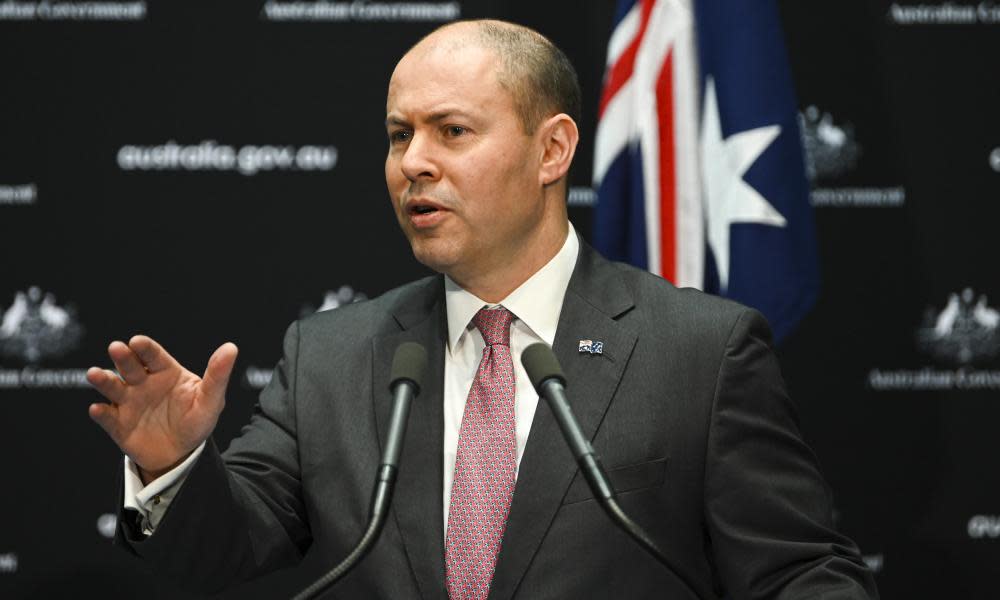Environmental groups excluded from Australian budget lockup

Environmental groups and progressive thinktank the Australia Institute have been excluded from the federal budget lockup with critics accusing the government of letting in “favoured mates” while banning independent voices.
The treasurer, Josh Frydenberg, has blamed Covid-19 for reduced numbers but the Australian Conservation Foundation and Greenpeace have cried foul ahead of the 6 October budget.
The decision leaves no environmental groups in the lockup for a budget expected to provide further detail of the Coalition’s plan for job creation, which includes an expansion of gas extraction and fast-tracking of project approvals.
Although Covid-19 has reduced early access to the budget papers on 6 October the controversy follows a trend of long-term decline in transparency.
Related: Farmers push back on Coalition’s gas plan saying quality of land and water takes priority
In 2019 – before the Covid crisis – Treasury offered just 134 places to stakeholders such as business groups, unions, NGOs and welfare groups, down from 236 in 2018.
Early access under embargo is considered desirable to study budget measures and provide immediate reaction to new policy announcements, such as increases or cuts to spending or regulation.
Guardian Australia contacted a sample of lobby groups and other stakeholders, finding many had successfully applied to attend the lockup including the Red Cross, Refugee Council and People with Disability Australia. Anglicare applied and was successful; UnitingCare applied and was rejected.
The Australia Institute, one of the most prominent critics of bringing forward income tax cuts, expected to be the centrepiece of the budget, applied but was rejected.
The Grattan Institute secured a spot in the Canberra lockup, but senior staff including chief executive Danielle Wood will be unable to attend due to the Melbourne lockdown.
The Australian Conservation Foundation and Greenpeace both applied and were refused, with no explanation provided by Treasury. Other environmental groups do not regularly attend the budget lockup.
Matt Rose, the ACF’s economy and democracy program manager, said: “As Australia’s national environment group, ACF has been represented in the pre-budget lockup for at least the last 15 years – probably for much longer.”
“Australians are looking to the federal government to make sure coronavirus recovery spending simultaneously tackles the climate and biodiversity crises,” he said.
“Since 2013 federal spending on the environment has been cut by 39.7%. In last year’s budget the government spent $4.36 subsidising pollution for every dollar it spent on climate action.”
Jonathan Moylan, a Greenpeace Australia Pacific spokesperson, said the budget is “absolutely critical to rebuild Australia with future-proof jobs and projects that ensure our economy thrives in a low-carbon world”.
“The federal government’s attempts this year to waste public money on the dying gas industry while global capital is fleeing towards zero-emissions growth is like throwing good money after bad,” he said.
“It would be wildly inappropriate if the government is once again only letting their mates in the room and most Australians would be appalled that the independent voices that represent them and the issues they care about are excluded.”
A spokesman for Frydenberg declined to answer questions about how Treasury determined who to allow into the lockup.
Related: Government to wind back responsible lending obligations to kickstart economy
He referred Guardian Australia to Frydenberg’s announcement on 11 September that “due to the heightened health risks and restrictions, smaller than usual stakeholder lockups will be held in Sydney and Canberra”.
“With all Covid-19 mitigations and controls in place, these secure events will be strictly limited,” he said. Media will access the budget papers in the Canberra press gallery with smaller lockups in capital cities.
In 2019, Treasury was accused of excluding organisations representing women, children and Indigenous Australians, prompting it to allow two extra spots for women’s groups.
In March, the Morrison government appointed former the Fortescue executive, Nev Power, to lead the National Covid-19 Coordination Commission.
The commission called for the government to underwrite expansion of the gas industry and declined to recommend a renewable energy led recovery despite calls from business leaders to do so.

 Yahoo News
Yahoo News 
